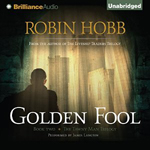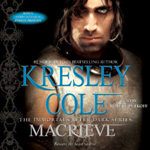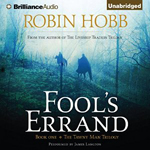
 Fool’s Fate (Tawny Man Trilogy #3)
Fool’s Fate (Tawny Man Trilogy #3)By Robin Hobb; Performed by James Langton
Publisher: Brilliance Audio
[UNABRIDGED] – 35 hours
FitzChivalry Farseer has become firmly ensconced in the queen’s court. Along with his mentor, Chade, and the simpleminded yet strongly Skilled Thick, Fitz strives to aid Prince Dutiful on a quest that could secure peace with the Outislands—and win Dutiful the hand of the Narcheska Elliania.The Narcheska has set the prince an unfathomable task: to behead a dragon trapped in ice on the isle of Aslevjal. Yet not all the clans of the Outislands support their effort. Are there darker forces at work behind Elliana’s demand? Knowing that the Fool has foretold he will die on the island of ice, Fitz plots to leave his dearest friend behind. But fate cannot so easily be defied.
Disclaimer: This is a review of the third book in a trilogy and the review will likely include spoilers from preceding books. I’d strongly recommend starting with the first book in the trilogy (Fool’s Errand) or better yet, Assassin’s Apprentice since the Farseer trilogy is very good and all these books are related.
Fool’s Fate is the last book of the Tawny Man trilogy. The story picks up immediately where Golden Fool left off as the Farseers are preparing to travel to the island Aslevjal to kill the dragon Icefire. The Fool has also told FitzChivalry that they must save Icefire to put the world on a better path. Which will Fitz decide: his oath of loyalty and allegiance to the Farseer throne or his role as the Catalyst of the White Prophet? I’ve really enjoyed all of the books in this trilogy leading but this book stands out as something special.
The whole premise of the book is based on a challenge Prince Dutiful was goaded into and that the adults don’t particularly want to do. It’s pretty obvious that something else is at play with the Outislanders in making this challenge and the result is a fantastic conclusion to the Farseer and Tawny Man trilogies. As already stated, FitzChivalry’s struggle with his role as the Catalyst while also serving his realm have you wondering what will happen all the way up to the climax.
As I listened to this story, I really felt like a full story was being told in which I couldn’t see the seams. I normally can’t help my mind picking a story apart into its elements to determine what’s going to be important later in the story but things weren’t so obvious here. There are so many things going on that it just feels like an active world as opposed to having just a few conveniently introduced devices to be used later (for instance, you know when Harry Potter learns a new spell that it will almost certainly be the sole thing that gets him out of trouble later. Expecto Patronum!). What will be important here? New understandings of the Wit from Webb? The newly forming Skill coterie? Chade’s blasting powder? Something old Elderling tools? Hobb does a great job working everything together into a good ride.
If there is one weakness in this book, it’s that it wraps things up too well. When I say too well, I mean that the falling action and conclusion of the book feel like the resolution to both the Farseer and Tawny Man trilogy as so much of what happens even concludes questions you may not even realize you had. The falling action and conclusion also take up about 1/3 of the book which kind of threw me. I was avidly consuming the story through the climax but then felt like things dragged out a bit afterward. Don’t get me wrong – I loved all of it, I just thought it was worth mentioning.
As with the previous installments of this trilogy, James Langton does a fantastic job with his narration of this book. There were times I forgot I was even listening to an audio book because I was just so into it. If I had one gripe it would be that some voices sound quite similar but those that do rarely have scenes together (Hap, Dutiful, Swift). I would definitely look for Langton reading other books.
Posted by Tom Schreck
 Heraclix and Pomp: A Novel of the Fabricated and the Fey
Heraclix and Pomp: A Novel of the Fabricated and the Fey Golden Fool (The Tawny Man, Book 2)
Golden Fool (The Tawny Man, Book 2) Macrieve (Immortals After Dark #13)
Macrieve (Immortals After Dark #13) The Kingmakers (Vampire Empire #3)
The Kingmakers (Vampire Empire #3) Fool’s Errand (Tawny Man Book 1)
Fool’s Errand (Tawny Man Book 1)